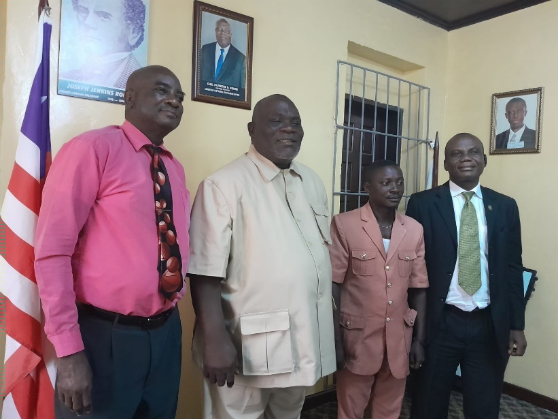Senator Abraham Darius Dillon has questioned the suspicious appearance of US$30 million in the 2022 Recast Budget by the Guinean concessionaire, HPX, also called Ivanhole.
The Senator, while critiquing the 2022/2023 budget on Tuesday, July 12, 2022 in the plenary of the Liberian Senate, raised the issue of a US$30 million revenue expected to come from HPX, and could not figure out the basis for HPX giving such a huge amount of money, particularly when the company has no legal arrangement with the Republic of Liberia.
The senator looked very troubled when he asked whether there was an existing MDA between the Government of Liberia (GOL) and the company.
Under “Promised Restatement of the Fiscal Year 2022 Budget”, which was passed by the House of Representatives with no deliberation, revenue from HPX is the first “Proposed Revenue Source”, with a total contribution of US$30 million (thirty minion), followed by ArcelorMittal negative -25 million (twenty-five million), leaving a balance of US$5 million. It appears like the GoL has unofficially decided to take HPX US$30 million over AML’s initial payment of US$25 million, which was to be transferred to GoL as signature bonus and reservation fees after the company’s new MDA is ratified.

Senator Dillon alarmed, “I have a few concerns. HPX, whatever it is contributing US$30 million to the budget…Maybe I forgot: is there an existing agreement between the Government of Liberia (GOL) and this HPX regarding the usage of our railroad, and has this agreement been brought before this body for our Legislative consideration?”
Senator Dillon wondered how the Ministry of Finance would include in the recast budget a source of revenue that has not been scrutinized in line with the provisions of the relevant laws of Liberia.
“I was wondering if there was an MDA between the company and the Government of Liberia (GOL) for which such an amount is projected as revenue to be received from this company,” Senator Dillon said.
The Montserrado County lawmaker argued that HPX is a concessionaire, and all its agreements with the government are subject to rectification by the National Legislature.
“So we are taking people’s money but we have not done the legal thing to bring their agreement before the Legislature for rectification in keeping with the law?”
As Dillon spoke from his seat in the lower right of the Senate’s chamber, the Senate went completely silent in an apparent shock: a foreign firm whose agreement has never reached the stairs of the Capitol Building was contributing a whopping US$30 million in revenue through the budget without any explanation of the basis.
The Liberian budget is a government document prepared by the Executive Branch through the Ministry of Finance and Development Planning, presenting its anticipated tax revenues and proposed spending/expenditure for a financial year. So, under what legal arrangement is HPX paying US$30 million to the budget?
Of course, it cannot be through anticipated tax revenues, as HPX, as a firm wanting to do business in Liberia, has no legal agreement in place. This is true because, Article 34 “d” of the Liberian Constitution gives the Legislature the power to “levy taxes, duties, imports, excise and other revenues, to borrow money, issue currency, mint coins and to make appropriations for the fiscal governance of the Republic”.
This power given the Legislature also includes all revenue bills, whether subsidies, charges, imports, duties or taxes, and other financial bills, shall originate in the very House of Representatives, which failed to raise any question about HPX’s $30 million in the absence any legal agreement.
The Constitution is clear that the “Senate may propose or concur with amendments as on other bills (financial bills)”, and particularly warns that “no other financial charge shall be established, fixed, laid or levied on any individual, community or locality under any pretext whatsoever except by the expressed consent of the individual, community or locality”.
Industry watchers and people familiar with the dealings of Capitol Hill as it relates to concession agreements say they fully agree with the qualms and critical questions raised by Senator Dillon about HPX’s huge payment.
One member of the House of Representatives with over 12 years of high-profile mining consultancy said, “The Senator is very right in posing these questions because, without a mineral development agreement that sets out what is expected of the government and the company, it could be very dangerous for Liberia’s interest.”
The representative, a key member of the leadership of the House (he asked not to be named), said he had no knowledge of why the government is accepting US$30 million when HPX’s agreement has “never been seen by any of us here”.
He however suggested that the money could be a means of entrapment for the Liberian government to allow HPX to use the railway unhindered and deny ArcelorMittal the right to be the operator of the rail.
The lawmaker believes this is true because HPX wants to “flip” or, in other words, sell the Guinea iron ore deposit to another firm for billions of dollars, but this firm does not want ArcelorMittal to be the operator of the Yekepa-to-Buchanan rail, even though ArcelorMittal invested about US$500 million on the rail and port in 2007 to restore these infrastructures, which were pillage and scrapped during Liberia’s 14-year crises.
“Why is a responsible corporate entity paying the Liberian government money without an agreement that is publicly available for scrutiny by all relevant Constitutional entities like the Legislature?” he asked.
High Power Exploration Inc. (HPX) is a Canadian metals-focused exploration company firm founded in 2010.

The company was awarded the Nimba Iron Ore Project in the Republic of Guinea and decided to do more shipment of its iron ore through Liberia to the Buchanan Port after its exploration found viability of developing world-class high-grade, low impurity and direct-shipping ore deposit. The feasibility study is expected to be completed in early 2023.
In March 2022, the Government of Liberia (GOL) made no preceding announcement of the concluding of an impending agreement with HPX Group of Companies (Ivanhoe Liberia), for the use of the Yekepa to Buchanan rail and port facilities in Buchanan.
While the Legislature was still actively debating the ArcelorMittal 3rd Amendment, the Executive proceeded with speed and velocity to surreptitiously negotiate and sign a deal with HPX, which was awarded the Guinean side of the iron ore mountain range.
In fact, the entire agreement was shrouded in secrecy, and to date no other branch of government has knowledge of the provisions in the deal. Even more concerning is the information that some reporters contacted HPX to confirm news of the secret deal with the government and they denied that any agreement was entered into with GOL; however, they confirmed that a non-binding MOU was concluded.
This raises more questions than answers. The quarry of Senator Dillon as to which arrangement was HPX’s US$30 million included in Liberia’s national budget was timely and legitimate. This dealing with HPX, if not handled with care, may plunge Liberia into an unnecessary long-running international legal battle which may not be good for Liberia’s investment image, since ArcelorMittal’s current MDA requires the consent of ArcelorMittal before any other company uses the rail. ArcelorMittal’s 3rd agreement with GOL, which was returned by the Lower House, refined the article on rail and port and provides for a multiuser arrangement, which allows other companies to utilize the port and rail after they have built the capacity.
As reported by FrontPage Africa in March, their source suggested then that the document/agreement between GoL and HPX appeared to have been signed between Saturday, March 26 and Monday, March 28, 2022, while the title page carries a date of March 30, suggesting that the HPX framework document was signed much earlier.







